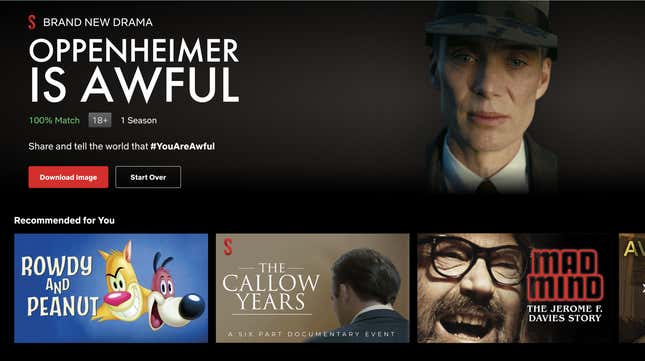Season 6 of Black Mirror kicks off with an episode called Joan Is Awful. If you haven’t watched yet, the premise is essentially this: When you sign up for Streamberry (Black Mirror’s version of Netflix), you sign away the rights to your likeness and life. Streamberry can then use the events of your day-to-day life to make a show about you. In this case, the main character, Joan, has her day put on blast for the entire Streamberry community to stream in a show titled Joan Is Awful, all but ruining her life.
It’s very Black Mirror, and pokes more fun at Netflix’s corporate policies than you’d expect from a show on that platform. Perhaps that’s why, to continue the “fun,” Netflix launched a fake Streamberry sign-up site: When you “sign-up” for Streamberry, you enter your name, upload a photo, and, presto: Streamberry’s homepage updates with a new “You Are Awful” show at the top, just like in the show. If I were to participate, for example, I’d see “Jake Is Awful” appear at the top.

This isn’t the first promotion of its kind, of course. Barbie ran a selfie generator campaign that let you put your face on one of its movie posters. But there’s an irony here that I can’t tell whether Netflix wants you to notice or not: Just as Joan signs away the rights to her life and likeness by subscribing to Streamberry, you sign away the rights to your image when you upload a photo to this “You Are Awful” experience.
“Streamberry’s” Terms of Service isn’t friendly with your data
Before you upload a photo to the experience, the site invites you to read the Terms of Service, which is basic practice for anything we do online. The terms are full of “we’ll take all your data” language: Netflix will scrape your IP address and GPS coordinates (to determine your approximate location); they’ll take your audio, electronic, visual, thermal, olfactory, or similar information (no clue how they’d take “olfactory” info, but OK); and they’ll share your data within the Netflix family of companies, among many other caveats.
Netflix also retains the rights to use your “You Are Awful” experience in its billboards promoting the show. So you might upload your photo as a one-time thing, but get a text from a friend in Los Angeles come award season that your face is being used to court votes for a Black Mirror Emmy.
But it’s the “Name and Likeness” section that’s particularly Black Mirror-esque:
By interacting with this Experience, you grant the Netflix entity that provides you with this Experience, its affiliates and respective successors and assigns and anyone authorized by any of them (collectively, “Netflix”), the irrevocable, perpetual, worldwide, non-exclusive right to record, depict, and/or portray you and use, and grant to others the right, but not the obligation, to record, depict, and/or portray you and use, your actual or simulated likeness, name, photograph, voice, actions, etc. in connection with the development, production, distribution, exploitation, advertising, promotion and publicity of this Experience, in all media, now known and later devised, and all languages, formats, versions, and forms related to such Experience without compensation to you or any other individual, unless prohibited by law.
I’d chalk it up to Netflix continuing the Black Mirror immersion, if this wasn’t actually a binding legal document. If Netflix had the technology to produce “Joan Is Awful” in real life, it seems like they would. While that remains impossible (at least I assume), the language allows Netflix to use your image (and any other aspect of yourself) in any way it wants to. If you use this experience, don’t be surprised if Netflix uses your face in a future show of theirs, however they want to.
It’s not just “Streamberry’s” terms of service that concerning. Netflix’s own TOS is rife with morally gray language that could end up in a future Black Mirror episode. As Mashable covers, these terms range from testing new features and policies on you by default, to Netflix absolving themselves of any responsibility should their content hurt you.
We might all be a bit worn out by internet data privacy conversations. We know companies like Netflix, Google, and Meta leech our data for corporate gain. But just because this is the world we live in, doesn’t mean we need to unwittingly hand over more of our data. In fact, it’s worth taking a look at what data you do hand over to these companies, Netflix included, and think about ways to offer less. You might be paying more than ever to subscribe to Netflix following the password sharing crackdown: There’s no need to hand over your data as well.
Use the “You Are Awful” experience if you want, but understand what you’re signing up for (and what you’re signing away).









